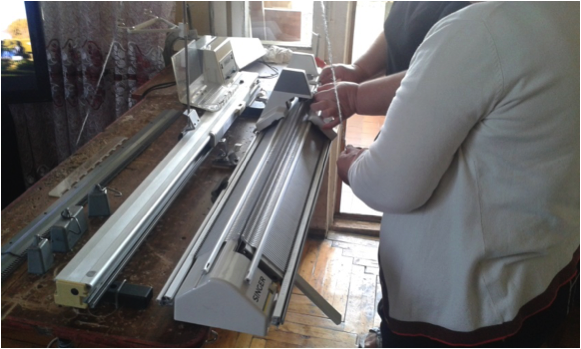Yerevan—In January 2015, the Near East Foundation UK (NEF UK) and the Gegharkunik Chamber of Commerce and Industry’s (CGGI) launched a project—financed by the European Union—to advance gender equality and the rights of survivors of gender-based violence (GBV) in Armenia. Now, in only the tenth month of the project, there is an opportunity to share some of its successes.
Last month, NEF UK, GCCI, and their partner and beneficiary civil society organizations (CSOs) set up and furnished four safe spaces in the Yerevan, Lori, and Syunik regions in Armenia to welcome women for meetings, workshops, networking opportunities, and business development trainings. Over ninety women survivors participated in these trainings and workshops aimed at improving economic agency, equality, and economic independence for women survivors of GBV.
About two thirds of the participants have chosen an enterprise development stream, while the rest have chosen an employment development stream. At the workshops, a selection committee was set up to assess business plans presented by enterprise development program participants and to determine which plans were at an appropriate stage to receive funding. Of the fifty women, twenty-five in the Yerevan group were selected to receive funding for their microbusinesses.
“I had no hope that I could receive funding for my small business that I was dreaming about for many years. My family never supported me to earn money, now I have proved that I am able to do something.’’ said one of the participants in the training who recently received funds to purchase a modern knitting machine to make clothes. She already has made arrangements with nearby fashion centers to sell the clothes she is making.
The business ideas presented to the committee were diverse and spanned from traditional business ideas, such as baking, hairdressing, nail art, and cosmetology to less traditional ambitions like shoe production, pottery, and opening and running a bistro.
Another woman who is improving her cosmetology skills also received a grant, and afterward said: “My trainings are going very well. This profession is perfect for me, I like it so much! I have purchased all the necessary items through the grant and I am looking forward to starting my small business now. Thank you very much, this is the start of my future career and success which was made possible with your support.”
In addition to those who have developed plans for their micro-businesses, a second group of participants are supported with trainings to improve their CVs and employment status so that they can earn an income to increase their economic independence. Since the project launched in January, thirty-three women from the Lori region and Yerevan have attended job skills development training sessions and were presented with job opportunities available for them to pursue.
After receiving vocational training in hairdressing, one of the women plans to start a home based business. She told us: “First of all, you made a change in my family’s outlook in that women are not created only for sitting at home, but also for working and earning. My husband never allowed me to work. Now, when I receive vocational training and have plans to start my small hairdressing business at home, my husband has become more interested in what I am learning and my success. Thank you very much not only for the grant and for funding my vocational training, but most of all for making a positive change in my family’s life.”
Since July, six participants of the job component have found and sustained jobs, which include the following sectors: accounting, cleaning, baking, gardening, health care, and secretarial work. Seven women have made arrangements with potential employers to get jobs after receiving vocational training, and three of the employers have promised to promote women to positions with more responsibility after they attend the vocational training sessions.
The job skills development training sessions have improved participant’s communication and negotiation skills, as well as increased their self-confidence and capacity for self-reliance. One of the workshop’s trainers said that they have seen an ‘’increase in the project participants’ self-confidence during a very short time. We see positive changes in their behavior every day.’’
Along with helping survivors of GBV, the project aims to strengthen CSOs’ internal capacities and technical skills in protection strategies linked to economic empowerment activities for survivors of GBV. Since the project launched, seventy people from a number of state and non-state agencies have participated in round tables conducted in Goris, Spitak, and Yerevan. The purpose of the round tables was to increase the ability of the community and state agencies to facilitate inclusive civil society and community dialogue, private-public-civil-society collaborative activities, and learning and awareness initiatives linked to GBV prevention and gender equality. Ten more round tables are planned for January 2016.
Despite being in its early stages, the project has already seen tremendous success in the communities in which it works. The project team and beneficiaries are looking forward to the next phases and future achievements with the hope that a positive and lasting impact will be made for gender equality and prevention of GBV in Armenia.
This project is funded by the European Union and implemented by the Near East Foundation UK in partner with the Gegharkunik Chamber of Commerce and Industry.



